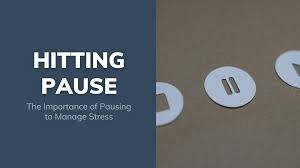Stress and Ways to Manage It

What is stress? Stress is a state of worry or mental tension caused by a demanding situation. It is a natural human response that prompts us to address challenges and threats in our lives. Everyone experiences stress to some degree. But the way we respond to stress makes a significant difference to our overall well-being (who.int).
How does stress affect us? Stress affects both the mind and the body. A little bit of stress is good and can help us perform daily activities. Too much stress can cause physical and mental health problems, such as headache, sleeping troubles, feeling unwell or lack of focus at work. Uncontrolled stress can lead to more serious issues such as high blood pressure, heart disease, stroke, obesity, and diabetes.
We must all find ways to manage our stress, and medication isn’t always the answer. There are many ways to help manage your stress that do not involve medication. You might think that you are destressing and relaxing while watching TV or playing a video game, but did you know those make your stress go up over time? Those are examples of idle time; they don’t get you moving; therefore, you’re not releasing the endorphins needed to relieve those nasty stress bugs!
Some healthy ways to fight stress are:
1. Get regular exercise as many days as you can. Exercise helps you feel more relaxed, and it also helps you sleep better. Regular exercise releases the endorphins that combat stress and aid in elevating your mood.
2. Try relaxation techniques; deep breathing, meditation, yoga, or get regular massages. Deep breathing lowers your heart rate and blood pressure and increases your oxygen intake. Meditation can help by allowing you to focus on your breathing and forgetting about the hectic day you may have had. Yoga calms your mind and releases stress through the various poses and stretches. Massages are good for everything! You must practice deep breathing when you are having a massage and your entire body relaxes, so a massage is always an effective way to de-stress.
3. Maintain a sense of humor. Laughter helps with everything; if you can laugh at yourself, then you can laugh at anything. Laughing releases those endorphins again which helps reduce your stress and improve your mood.
4. Spend quality time with friends and family. Friends and family can offer a place to share your thoughts and concerns. Sometimes all you need is an ear to listen to what is going on and having someone you can confide in is a wonderful way to get things off your shoulders. They can also remind you how special and important you are.
5. Read a book, listen to music, or go for a walk. These are more ways to relax and lose yourself for a while. Get lost in your book or your music; take that walk and make it a little longer each time.
6. Set aside some time to write in a journal. Try to write something each day. Write about what stressed you out; go back to it after about a week or so and see if you are having the same triggers. If so, see what you can do to change things to remove that trigger.
7. Make sure you get plenty of sleep. You get stressed so much easier when you’re tired. You feel that nothing is going right, and you could just curl up and go to sleep. Try to get 7 – 8 hours of sleep each night.
8. Try to eat a healthy, well-balanced diet. Eating a lot of junk food will cause your blood pressure to go up, which causes your stress level to increase. Please try to eat a healthy, well-balanced diet to maintain a healthier stress level and blood pressure level too. I’m not saying you can’t splurge and have that burger or ice cream every now and then, just in moderation.
9. Stay away from alcohol and drugs. Drugs and alcohol only make us numb and put us in a state of depression, which what? You got it, increases our stress! Stay away from them! You can have the social drink or two, but don’t drink to forget your problems, they will only be enhanced by the alcohol or drug.
10. Stay away from the TV news. Watching the news on TV these days is enough to stress anyone out; just don’t do it! Watch a game show, or a comedy; remember laughter helps release those endorphins!!!
You can manage your stress without medication. Just making some minor changes in your life can make a big difference! If you are a caregiver and need ways to cope, we at Assisted Living Made Simple hold 4 Alzheimer’s caregiver support groups a month. If you’re trying to cope with the grief of a loved one, we have two grief support groups a month. If you need to find placement for elderly loved ones, we can assist you with that as well. Just give us a call on 386-847-2322 to learn more about our services, which are all free!




